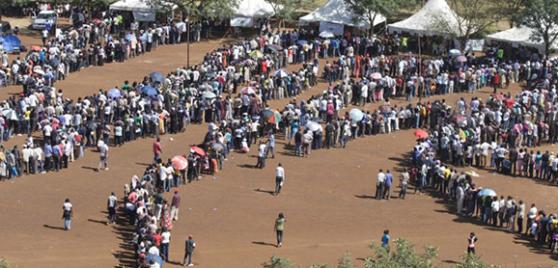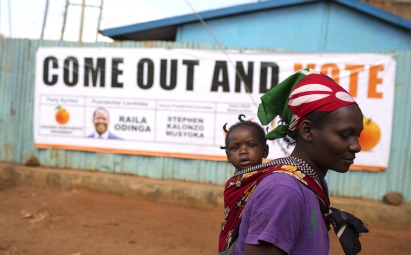
As Kenyans go to the polls, observers are bracing for a replay of the country’s horrific 2007 presidential elections, which produced a wave of ethnic violence that killed more than a thousand people and displaced over a half a million.
The violence was even more traumatic given that at first things had seemed to be going well. Kenyans had voted peacefully and in great numbers. When it became clear that the incumbent, Mwai Kibaki was losing, however, he rigged the count and declared himself president. Public frustration awakened long-standing latent ethnic tensions. The conflict, which lasted a week, eventually ground East Africa to a halt; it is thought to have cost the Kenyan economy more than a billion dollars. Most of those who spearheaded and perpetrated such violence have yet to be held to account.
There is no telling whether today’s election will have such disastrous consequences. Polling indicates that the contest is far too close to call. In all likelihood, the first round of voting will lead to a runoff election on April 10 between Raila Odinga, the current prime minister of Kenya’s hastily-constructed unity government, and Uhuru Kenyatta, Kenya’s deputy Prime Minster and the son of Kenya’s first president. The tightness of the race bodes ill; it is unlikely that either side will be able to score a quick victory, and it will not take much vote rigging to influence the election’s outcome. The losing party is virtually certain, therefore, to contest the results. Some violence, in other words, seems all but assured. The question is how long it will last, whether it will spread nationwide, and how many people will be displaced, injured, or killed.
Adding to the tension is the International Criminal Court’s (ICC) indictment of Kenyatta and his running mate, William Ruto, for crimes against humanity during the rioting in 2007. The ICC move was met with outrage in Kenya. The Kikuyu and Kalenjin tribes believe that the court has unfairly targeted their leaders, to which Kenyatta and Ruto belong, and ignored the role played by the Luo and other tribes. Indeed, Kenyatta and Ruto, along with two co-defendants, are the only Kenyans who have been charged for the 2007 violence. This fact might be contributing to Kenyatta’s popularity.
But popularity aside, as Kenyan media and civil society groups have noted, the election of a person indicted by the ICC would inevitably dampen foreign investment, diminish the ability of donor nations to engage in security sector cooperation, hinder a range of foreign aid projects, and potentially subject the Kenyan public to rule by a distracted or pariah president. Moreover, it could bring US-Kenyan relations to a dead end. That would be a shame: Kenya is a vital regional hub for foreign aid and commerce, and is an increasingly important partner in US counterterrorism efforts, despite concerns that the US-funded Kenyan troops in Somalia have not taken sufficient steps to protect civilians during military operations.
Although a Kenyatta win would be disappointing for the United States, it need not precipitate a crisis. The idea that diplomatic ties would be immediately severed and Kenyatta instantly thrust into the same category as Sudan’s president, the infamous Omar Hassan al-Bashir, is absurd. Certainly, the ICC indictment is a stain on Kenyatta’s character, but it is not a conviction. As long as a President Kenyatta complied with the trial, it would be in the United States’ interest to treat the defendant as innocent until proved guilty. In other words, if Kenyatta wins the elections, the United States should accept the will of the Kenyan people and — after the inevitable accusations of rigging have been successfully managed through a Kenyan-led electoral board investigation, a recount, or a court trial — declare readiness to continue regular diplomatic and financial cooperation with the new administration.
Depending on its outcome, Kenya’s election could have difficult implications on the country’s ties with the United States and Europe. But the winner is less important than the process. If Kenya’s elections spark only limited violence, complaints about the outcome are handled in an orderly manner in the courts, and if the international community respects the outcome of the poll, Kenyans could regain some of their confidence in the democratic process and in their own capacity to resolve difficult political issues peacefully. That is the prize that these elections could deliver. And it would be well worth the price of patience and careful diplomacy with Kenyatta, or whoever wins.
Bronwyn Bruton is deputy director of the Atlantic Council’s Michael S. Ansari Africa Center. A longer version of this essay appears at Foreign Affairs. Photo credit: Reuters. Click here to watch Ms. Bruton discuss implications of the election on US interests on the CTV News Channel.
Image: kenyavote.jpg
